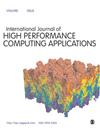Enabling efficient execution of a variational data assimilation application
IF 2.5
3区 计算机科学
Q2 COMPUTER SCIENCE, HARDWARE & ARCHITECTURE
International Journal of High Performance Computing Applications
Pub Date : 2022-08-28
DOI:10.1177/10943420221119801
引用次数: 0
Abstract
Remote sensing observational instruments are critical for better understanding and predicting severe weather. Observational data from such instruments, such as Doppler radar data, for example, are often processed for assimilation into numerical weather prediction models. As such instruments become more sophisticated, the amount of data to be processed grows and requires efficient variational analysis tools. Here we examine the code that implements the popular SAMURAI (Spline Analysis at Mesoscale Utilizing Radar and Aircraft Instrumentation) technique for estimating the atmospheric state for a given set of observations. We employ a number of techniques to significantly improve the code’s performance, including porting it to run on standard HPC clusters, analyzing and optimizing its single-node performance, implementing a more efficient nonlinear optimization method, and enabling the use of GPUs via OpenACC. Our efforts thus far have yielded more than 100x improvement over the original code on large test problems of interest to the community.支持有效地执行变分数据同化应用程序
遥感观测仪器对于更好地了解和预测恶劣天气至关重要。来自这类仪器的观测数据,例如多普勒雷达数据,经常经过处理,以便同化到数值天气预报模式中。随着这些工具变得越来越复杂,需要处理的数据量也在增长,这就需要高效的变分分析工具。在这里,我们研究了实现流行的SAMURAI(利用雷达和飞机仪器的中尺度样条分析)技术的代码,用于估计给定观测集的大气状态。我们采用了许多技术来显著提高代码的性能,包括将其移植到标准HPC集群上运行,分析和优化其单节点性能,实现更有效的非线性优化方法,以及通过OpenACC启用gpu的使用。到目前为止,我们的努力已经在社区感兴趣的大型测试问题上产生了比原始代码100倍以上的改进。
本文章由计算机程序翻译,如有差异,请以英文原文为准。
求助全文
约1分钟内获得全文
求助全文
来源期刊
CiteScore
6.10
自引率
6.50%
发文量
32
审稿时长
>12 weeks
期刊介绍:
With ever increasing pressure for health services in all countries to meet rising demands, improve their quality and efficiency, and to be more accountable; the need for rigorous research and policy analysis has never been greater. The Journal of Health Services Research & Policy presents the latest scientific research, insightful overviews and reflections on underlying issues, and innovative, thought provoking contributions from leading academics and policy-makers. It provides ideas and hope for solving dilemmas that confront all countries.

 求助内容:
求助内容: 应助结果提醒方式:
应助结果提醒方式:


